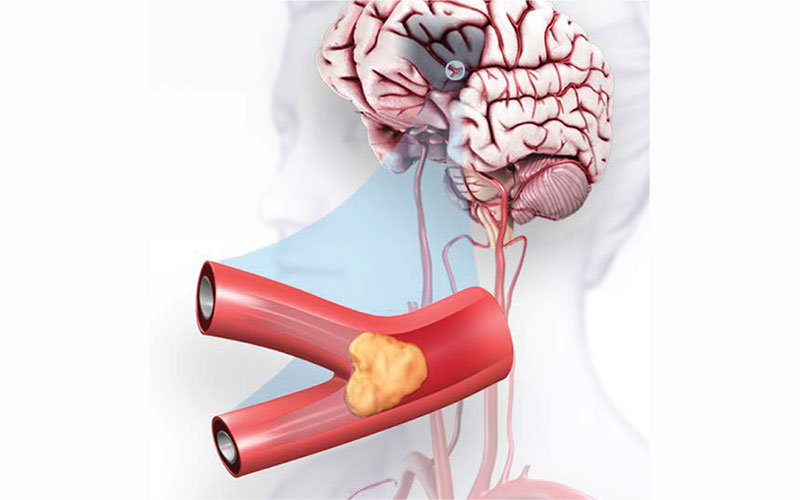Be Stroke-Savvy: Uncovering the Red Flags of Carotid Artery Stenosis


The carotid arteries are one of the main blood vessels in the human body which are responsible for delivering oxygen and nutrients to the head and brain. But the risk of blockage in these arteries, called carotid artery stenosis, steadily rises as we age. Carotid artery stenosis refers to the gradual thickening of the carotid artery walls, resulting in a narrowed passage, and potentially even a complete obstruction.
When these blood vessels become blocked, it can cause various symptoms, with the worst being a stroke. Stroke is a severe cerebrovascular disease that can lead to serious consequences if not treated in time. However, many people have limited knowledge and understanding of carotid artery stenosis, and may not realize the severity of this condition. So, we will delve into more details to help you better understand the symptoms and risk factors of carotid artery stenosis, as well as how to prevent and treat them.
Symptoms of carotid artery stenosis
Carotid artery stenosis usually does not cause any symptoms in the early stages, leaving people unaware until the condition becomes severe enough to obstruct blood flow to the brain, resulting in a stroke or transient ischemic attack. Symptoms may include:
-Sudden dizziness or loss of balance
-Sudden, unexplained intense headache
-Sudden blurred vision in one or both eyes
-Sudden trouble speaking or understanding speech
-Sudden numbness or weakness in one side of the body (face or limbs)
These symptoms can easily be overlooked or mistaken for signs of other health problems. If you experience any of the above symptoms, even if the symptoms only last for a short time and you recover quickly, seek medical attention immediately. You might have experienced a transient ischemic attack, and if left untreated, it could lead to a stroke.
Carotid ultrasound
Carotid ultrasound is a non-invasive examination that helps assess the health of the carotid arteries and diagnose carotid artery stenosis. The examination can measure the thickness of the carotid artery intima, atherosclerotic plaques, blood flow velocity, vascular resistance, and the blood flow in the vertebral arteries. Carotid ultrasound involves no radiation and causes no harm to the body. The procedure usually takes 15-30 minutes.
Carotid angioplasty and stenting (CAS)
If carotid artery stenosis has progressed to a certain degree, surgical treatment may be required. Carotid angioplasty and stenting (CAS) is a common surgery that places a stent inside the narrowed artery to restore blood flow and reduce the risk of stroke in patients.
In the surgery, the doctor will make a small incision in the patient's neck and then insert a thin, long catheter into the blood vessel. The catheter will pass through the vessel and reach the narrowed part of the carotid artery, and then the doctor will place a stent in the catheter to widen the diameter of the blood vessel, which unblocks the artery and restores blood flow.
Prevention of Carotid Artery Stenosis
The main cause of carotid artery stenosis is arteriosclerosis. Arteriosclerosis is caused by damage to the inner lining of blood vessels and is often associated with chronic conditions such as hypertension, hyperlipidemia, and diabetes. So, managing these chronic diseases is key to preventing carotid artery stenosis. To prevent or delay the progression of the disease, you can try following these suggestions:
-Maintain healthy lifestyle habits: A healthy lifestyle can effectively prevent arteriosclerosis and carotid artery stenosis. For example, you should quit smoking, limit alcohol intake, keep a balanced diet, reduce cholesterol, fat and salt intake, eat more fruits and vegetables and do regular exercises.
-Control your body weight: Obesity is a risk factor for chronic conditions like hypertension and hyperlipidemia.
-Relieve stress: Long-term stress and anxiety can lead to vasoconstriction and arteriosclerosis.
-Manage chronic conditions: Chronic diseases like hypertension, hyperlipidemia and diabetes are one of the main causes of carotid artery stenosis.
-Receive regular health check-ups: Regular health examinations can identify chronic diseases early on and facilitate treatment to prevent developing carotid artery stenosis.
The best way to prevent carotid artery stenosis is to maintain a healthy lifestyle. If you have any doubts about carotid artery stenosis, consult a professional doctor as soon as possible to avoid severe consequences.
Related Brands



